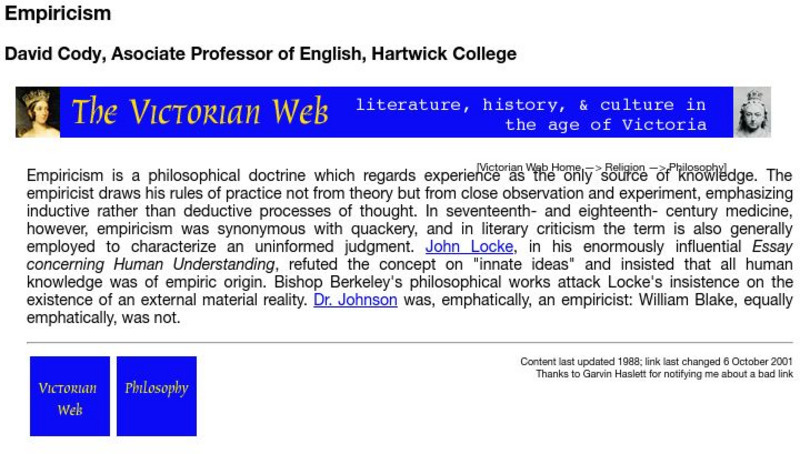Oregon State University
Oregon State University: John Locke
This Oregon State University site details the life of the great philosopher John Locke. The site provides a brief bio of Locke, information on his writings such as the Two Treatises of Civil Government, as well as a timeline of his life...
Famous Scientists
Famous Scientists: John Locke
This article reviews the scientific contributions and life of John Locke.
CommonLit
Common Lit: Political Society
A learning module that begins with "Political Society" by John Locke, accompanied by guided reading questions, assessment questions, and discussion questions. The text can be printed as a PDF or assigned online through free teacher and...
Independence Hall Association
U.s. History: Beginnings of Revolutionary Thinking: Impact of Enlightenment
The ideas of the Enlightenment began in Europe, but they were acted upon in the American colonies. See how the philosophies of John Locke and Rousseau influenced the thoughts and actions of Puritan clergy and political figures like...
CommonLit
Common Lit: Text Sets: Political Theory
As governments form and change over time, they look to political philosophers to answer important questions about governance. This text set covers some of the world's most influential political thinkers. This collection includes 10...
iCivics
I Civics: John Locke Mini Lesson
Introduce learners to the ideas and writings of John Locke that influenced the likes of Thomas Jefferson and other Founding Fathers.
iCivics
I Civics: Why Government?
Dig into philosophers Thomas Hobbes and John Locke's ideas and see how they've influenced those that have followed in their footsteps.
Columbia University
Columbia University: John Locke: Of the Conduct of the Understanding
A complete biography of the philosopher John Locke. It discusses his contribution to philosophy and his social contract.
Victorian Web
Victorian Web: Methodism
This essay discusses the cultural influence of the Methodist movement. The author theorizes that this factor may have had more impact on England's literary ideas than that of enhancing or neutralizing the revolutionary fervor of the...
Philosophy Pages
Philosophy Pages: John Locke (1632 1704)
This site offers a brief biography of philosopher John Locke and highlights of his accomplishments. The summary traces the development of his political beliefs through contrast with other writers of his time. Site includes a bibliography...
Tom Richey
Tom richey.net: Hobbes vs Locke
This PowerPoint with help your students see the difference in the philosophies of Hobbs vs Locke. Also explained is how those philosophies influenced England.
ClassFlow
Class Flow: Patriots vs Loyalists
[Free Registration/Login Required] This flipchart covers everything from The Boston Massacre to the Boston Tea Party and even more. It also provides an assessment.
Victorian Web
The Victorian Web: Empiricism
A brief definition is provided about English empiricism as developed in the Victorian age. Several links are provided for additional information on related subjects.
Curated OER
John Locke
This site from The Victorian Web allows on to read a brief but informative biography about John Locke and his major works and accomplishments on the Victorian Web. Includes black and white portrait, along with links to additional...
Curated OER
Educational Technology Clearinghouse: Clip Art Etc: John Locke
English philosopher, concerned with natural rights and justifying the revolution.
Curated OER
Educational Technology Clearinghouse: Clip Art Etc: John Locke
A 17th-century English philosopher. He developed the Lockean social contract, which included the ideas of a state of nature. He was also the first to fully develop the idea of tabula rasa.
Curated OER
Smithsonian Libraries: Scientific Identity: John Locke (1632 1704)
A portrait of John Locke from the Dibner Library of the History of Science and Technology, made available through the Smithsonian Institution's Scientific Identity Collection.
Curated OER
Smithsonian Libraries: Scientific Identity: John Locke (1632 1704)
A portrait of John Locke from the Dibner Library of the History of Science and Technology, made available through the Smithsonian Institution's Scientific Identity Collection.







